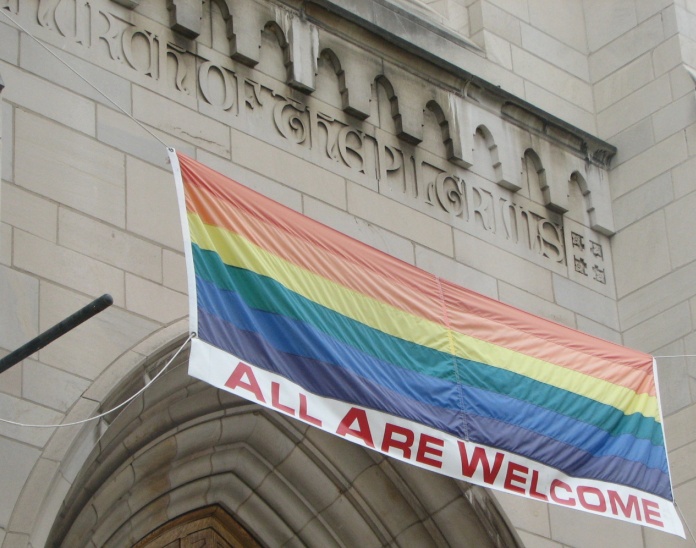Tennessee Store Owner Puts Up “No Gays Allowed” Sign After SCOTUS Ruling
After the Supreme Court legalized same-sex marriage in 2015, Jeff Amyx put up a “No Gays Allowed” sign outside his hardware store, Amyx Hardware & Roofing Supplies Store. Amyx, a Baptist minister, claims that same-sex marriage is against his religion.
Amyx faced backlash for his sign and replaced it with a similar sign that read: “We reserve the right to refuse service to anyone who would violate our rights of freedom of speech & freedom of religion.”
Three years later, Amyx is putting up another “No Gays Allowed” sign. Amyx is celebrating the new Supreme Court ruling in favor of a Colorado baker who refused to make a wedding cake for a same-sex couple. The Court determined that the Colorado Civil Rights Commission had violated the baker’s religious liberty rights. The Court did not rule on the constitutionality of Colorado’s anti-discrimination law.
Why Doesn’t the Colorado Baker Case Help Amyx?
As my colleague explained in a previous article, the Colorado baker case was a narrow decision. Some people might look at the 7-2 ruling and wonder how those numbers could be narrow. Legally, “narrow” means how many other cases a ruling could apply to, not how many justices joined the majority vote.
With the baker case, the Court did not rule on the question everyone was interested in: whether religion could be used as a shield against anti-LGBT discrimination laws and lawsuits. Instead, the majority of the Court focused on whether the Colorado Civil Rights Commission was biased against religion. They found that it had.
If Tennessee had an anti-LGBT discrimination law, it is highly probable that Amyx would lose any lawsuit against him. The Colorado baker case couldn’t be more different from Amyx’s sign.
First, Masterpiece Cakeshop did not completely deny homosexual couples service in their store. Masterpiece Cakeshop only denied selling custom made cakes to homosexuals; they sold everything else to homosexuals. In contrast, Amyx’s sign implies that it would deny gay people from even entering the store.
Second, the baker case focused on the free speech issues that come from custom made cakes. Most people would believe that a wedding cake is an important part of any wedding. It is possible that a wedding cake would be tact endorsement of the wedding by the baker.
The ruling in Masterpiece Cakeshop would only help Amyx if he offered custom goods or services that a reasonable person could associate with homosexuality and/or marriage. Under the SCOTUS ruling, the only possible service Amyx could deny to gay people would be the creation of custom made hardware or performance of custom roofing services.
 Private Business Discrimination of LGBT Can Still Be Illegal
Private Business Discrimination of LGBT Can Still Be Illegal
The biggest difference between Amyx and Masterpiece Cakeshop is that Amyx actually displays discriminatory intent towards gay people. There is a big difference between “No Gays Allowed” and “We reserve the right to refuse service to anyone who would violate our rights of freedom of speech & freedom of religion.” The latter statement is about the preservation of rights; the former is solely intended to hurt a certain group of people without providing a reason.
Probate and trust law illustrates the difference a little. Some trust settlors add conditions that their heirs and beneficiaries must comply with before they can receive their inheritance. A condition such as “my children cannot marry a black person” would not be enforceable in court. On the other hand, “my sons must marry a Jewish girl” would be enforceable.
The former condition is about racial animus. The latter is a desire to keep the family wealth within a certain religious faith. The principle would likely be applicable here as well and the only distinction – private wealth management versus public business, favors those against discrimination.
Unintended Consequences
Although the Masterpiece Cakeshop has been defined as a narrow case by most legal scholars, there are still potential unexpected side effects. One of the more interesting consequences would be greater emphasis on the thought process and statements of government decision makers.
The majority on the Court pointed out certain statements made by the Colorado Civil Rights Commission to show that members of the Commission were biased against religion, statements such as this:
Freedom of religion and religion has been used to justify all kinds of discrimination throughout history, whether it be slavery, whether it be the holocaust, whether it be–I mean, we–we can list hundreds of situations where freedom of religion has been used to justify discrimination. And to me it is one of the most despicable pieces of rhetoric that people can use to–to use their religion to hurt others.”
Justice Kennedy emphasized that phrases like “despicable pieces of rhetoric” were demeaning to Christians and other religious peoples. Although the Commission’s language helps conservative Christians in this instance, there are plenty of conservative lawmakers and executives who say things about minority groups that could be interpreted as hostile and demeaning.
Comments such as “Just because it’s done behind closed doors, it can still be prohibited by state law. Do you know that bestiality, the relationship between man and beast is prohibited in every state?” (Roy Moore, 2005) could be constructed as being anti-gay instead of pro-religious freedom.
Any conservative decision-maker who makes comments like this during a public hearing could find themselves on the wrong end of judicial review. Although the latest SCOTUS ruling was a victory for freedom of religion, there is a very fine line between protecting religious freedom and discriminating against other groups.
Amyx is walking along that line and his “No Gays Allowed” Sign easily tips towards discrimination instead of religious freedom. Ironically, someone like Amyx could be the next LGBT friendly Supreme Court case.


Comments